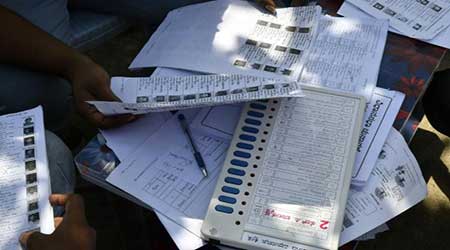Date : 31/05/2023
Relevance: GS-2: Role of civil services in a democracy.
Key Phrases: Fifth Estate, Eddelu Karnataka, Assembly Election, Civil Society, Secularism, Constituencies, Tenth Schedule, Basavanna, Legislative Assembly, Defection, High Court, The Supreme Court Of India.
Context:
- The recent elections in Karnataka should be considered a model for the power of people’s democracy, as civil society made the difference.
Key Highlights:
- The Assembly election in Karnataka witnessed a remarkable and unprecedented involvement of civil society in shaping the outcome.
- Without aligning with any political party, over 102 associations and organizations joined forces under the banner of "Eddelu Karnataka" (Wake-up, Karnataka) to challenge the strategies employed by political parties.
- Their objective was not to argue with the public or campaign against any particular party, but to awaken the people and address the real issues affecting them.
- By combating the divisive politics propagated by communal forces and promoting positive politics, secularism, and peace, civil society in Karnataka left a lasting impact on the electoral landscape of India.
A Campaign of Awareness
- "Eddelu Karnataka" was a movement aimed at rousing the populace
from political apathy during election time. Writers, poets, artists, and
filmmakers formed a cohesive unit within civil society to champion this
cause.
- Influential figures like Basavanna and Devanur Mahadeva inspired the people to unite against divisive elements and parties.
- The campaign generated lively discussions and debates within civil society, effectively winning over the hearts and minds of the electorate.
- The extensive efforts of the campaign included 250 workshops, meetings
with people in 103 constituencies, the formation of 192 groups, and the
mobilization of over 2,000 volunteers to campaign among voters.
- They collected data from 41,000 families, distributed 650 posters, and produced 80 videos.
- The campaign reached 151 taluk areas across 31 districts, leaving no stone unturned in raising voter consciousness against the communal agenda, divisive politics, and hate campaigns.
- With their unwavering commitment, the dedicated workers of this movement printed and distributed 100,000 pamphlets, focusing on friendship, opposition to hate, and the promotion of democracy, the Constitution, and the unity of the people.
Overcoming Political Strategies
- One notable achievement of the campaign was its ability to prevent the splitting of votes, a tactic often employed by political parties to secure electoral victories.
- Civil society groups successfully negotiated with 49 candidates, persuading them to withdraw from the contest and avoid splitting votes that would benefit candidates with a communal agenda.
- This accomplishment demonstrated their understanding of the strategies
employed by parties to manipulate elections and "purchase" elected
Members of the Legislative Assembly (MLAs).
- The campaign effectively grasped the intricacies of election politics and mastered the art of understanding the pulse of the public.
Defections and Overnight Governments
- The people of Karnataka have experienced the negative consequences of defection dramas, as witnessed in recent elections in states like Madhya Pradesh, Maharashtra, and Manipur.
- The political drama extended to the High Court and the Supreme Court of India. The Supreme Court, while observing its limitations in adjudicating petitions for disqualification under the Tenth Schedule, maintained that the Speaker of the House should decide on disqualification proceedings within a reasonable period.
- Furthermore, the court criticized the actions of the Maharashtra Governor, stating that they were not in accordance with the law and that the Constitution does not empower the Governor to intervene in inter-party or intra-party disputes.
- This situation highlights the need for greater adherence to the rule of law and serves as a reminder of the importance of safeguarding democratic principles.
The Model Role of Civil Society
- The recent elections in Karnataka serve as a model for the power of people's democracy in the face of criminal, religious, and communal manipulations, as well as the erosion of institutions.
- It exemplifies how voters can resist the influence of spin doctors and
manipulative political pundits.
- When engineered defections aim to subvert the will of the people and manipulate judicial verdicts, it becomes imperative for citizens to strengthen the democratic power they possess, just as the people of Karnataka did.
- In a time when the three traditional pillars of democracy—the Parliament, the executive, and the judiciary—alongside the Fourth Estate, appear to be under the control of the ruling regime, civil society acts as the last resort.
- Referred to as the Fifth Estate by some, civil society empowers
thinking individuals to reclaim control of the constitutional system and
assert their influence in safeguarding the principles of democracy.
- The people of Karnataka deserve commendation for their remarkable efforts in this regard.
Conclusion:
- The indelible imprint left by civil society in Karnataka during the Assembly election is a testament to the power of collective action and the ability of citizens to shape the course of their democracy.
- By raising voter consciousness, challenging divisive politics, and advocating for peace and secularism, civil society emerged as a formidable force capable of countering political manipulation.
- The campaign undertaken by "Eddelu Karnataka" serves as an inspiration for citizens across the country to actively participate in the democratic process, stand against political shenanigans, and uphold the principles enshrined in the Constitution.
- In an era where institutions are tested, the unwavering commitment of
civil society demonstrates the potential for citizens to safeguard democracy
and ensure the well-being of their nation.
- Karnataka's journey stands as a shining example of the profound impact the Fifth Estate can have in shaping the destiny of a nation.
Source: The Hindu
Mains Question:
Q. Explain the significance of civil society's involvement in shaping electoral outcomes, with specific reference to the case of "Eddelu Karnataka" in the Karnataka Assembly election. Discuss how the collective efforts of civil society can contribute to strengthening democracy and countering political manipulation. (250 words).







